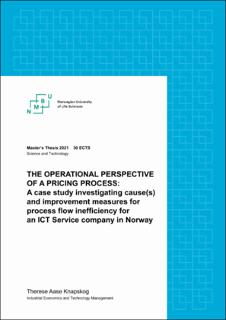The operational perspective of a pricing process : a case study investigating cause(s) and improvement measures for process flow inefficiency for an ICT Service company in Norway
Master thesis
Permanent lenke
https://hdl.handle.net/11250/3015988Utgivelsesdato
2021Metadata
Vis full innførselSamlinger
- Master's theses (RealTek) [1722]
Sammendrag
Purpose:
This study focus on the pricing process for an ICT Service Company in Norway. The aim was to investigate how a pricing process should be organised to achieve process efficiency in an operational perspective. Three research questions were created to achieve this aim. (1) What characterises the current pricing process. (2) What are the cause(s) for process flow inefficiency? (3) What are the recommended improvement measures?
Methodology and Theoretical Framework:
Research was conducted at one point in time, focused on an in-depth interpretation of non-numerical data. Main source for data were 15 process participants, collected through a semi-structured interview and analysed thematically. Following a flexible research design, there has been a continuous shift between data collected (empirical) and theory. The theoretical framework focused on the building blocks of pricing, the pricing factors.
Findings:
The pricing process were found to be simplistic and having a little degree of standardisation. Including utilisation of highly experience-based knowledge ba- sis, a lack of guidelines, in addition to dependencies that determine how the pricing process were executed. Following, it was found that the complexity of sales opportunities processed were the main source for process inefficiency. Such as utilisation of resources being dependent on type of case, which resulted in clarifications, lack of basis for comparison and/or limited internal capacity. Additionally, utilisation of resources compensating for lack in appropriate framework, such as information basis and price objectives. Consequently, improvement measures found were a targeted improvement of factors in-line with pricing requirements and chosen pricing model. Starting with establishing price objectives and followed by determining short-term and long-term goals for re-organising the process. The study argues that pricing require continuous effort and prioritisation to sustain process flow efficiency.
Value Contribution:
For practice, findings can inform managers on the link between pricing factors, causes for process flow inefficiency and improvement measures. Especially the importance of appropriate framework based on goals and chosen pric- ing model. Moreover, demonstrates a practical approach to how managers should prioritise improvement measures, when aiming to re-organise their current pricing process. For research, this study complements existing studies with a more operational and overall view on pricing. Including an in-depth view of how a pricing process can be executed. Additionally, proposed causes for inefficiency that should be further investigated trough qualitative and extensive research to determine the exact effect on operation of a pricing process.
Utgiver
Norwegian University of Life Sciences, Ås
Med mindre annet er angitt, så er denne innførselen lisensiert som Attribution-NonCommercial-NoDerivatives 4.0 Internasjonal
Beslektede innførsler
Viser innførsler beslektet ved tittel, forfatter og emneord.
-
Food prices in sub-Saharan Africa : four essays on grain prices, food aid, cross-border trade and fuel prices
Arega, Meron Assefa (PhD Thesis;2015:20, Doctoral thesis, 2017-11-29)The central concern of this thesis is the measurement and explanation of food price movements in Ethiopia and Malawi. The main objective is to examine how food grain pricesrespond to domestic and international commodity ... -
Price Relationships between EU CO2 Allowances and Energy and Commodity Prices
Nordby, Jill Francoise (Master thesis, 2011-11-07)This thesis concentrates on relationships between EUA prices and the European and Scandinavian electricity markets, as well as oil and commodity prices. The main purpose of the paper is to explore what relationships exist ... -
Impact of oil price shocks on the Norwegian economy : an emperical analysis on how shock in the oil price affect the Norwegian macroeconomy from 1990 to 2016
Østensen, Erlend (Master thesis, 2018)The impact of oil price shocks on the macroeconomy has been debated since the 1970s. The initial empirical results were that there was a significant negative effect between oil a positive price shocks and GDP in oil-importing ...

